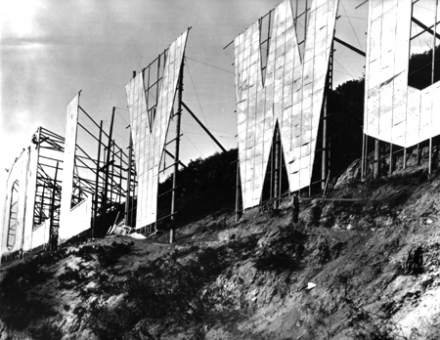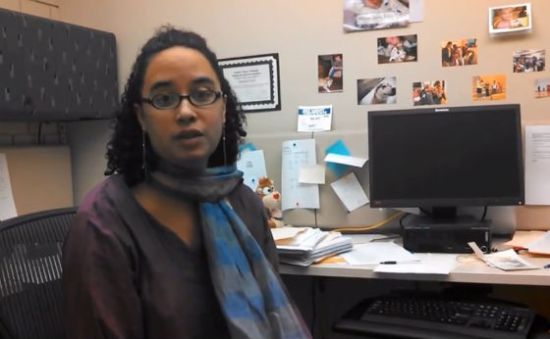It is a known fact that the media we consume shapes our perception of the world: after all, media has economic, political, social and aesthetic purposes. Martin Gilens wrote a book some time ago, for example: Why Americans Hate Welfare: Race, Media, and the Politics of Antipoverty, which explores the role of media in the shaping of myth and misconception of welfare policy. And what about the shaping of misconception of racism? We all know Fox News has a nice handle on that, as far as “news” media goes. But what about pop culture? Hollywood? How do the films we flock to theaters to see shape our world? I can think of more than a few examples, as I’m sure any thinking person can. But one in particular comes to mind: films about slavery and the way they shape perceptions of racism in white audiences. Namely the idea that racism is a thing of the past and only existed on Southern plantations a long, long time ago.
Since the release of 12 Years a Slave I’ve had many conversations about films that are about slavery. The conversations that stand out to me the most are the ones where the consensus is, “Why do all the films in Hollywood that feature black people have to be about slavery?” and my own undying question about the underrepresentation of black people in Hollywood, “Why does a film need to be about the subjugation of black people in order for it to have more than a one solitary black character?” And also, “Why did so many more white people go to see 12 Years than Best Man Holiday?”
While films like 12 Years a Slave are extremely important in understanding the past and the effect it has on the present, they have an interesting effect on white audiences whose ideas of racism are of the “post-racial” or “colorblind” variety: the effect is almost one of relief. When I left the theater of 12 Years a Slave, the kind of words I heard from the lips of the other white people leaving were things like, “God, it was just so bad back then.” And even things like, “Those people were horrible. Fuck those slave owners.” So, in a sense, relief. “It was so bad back then” translates as “Things are so much better now,” and “Those people were horrible” translates as “We don’t do that anymore.”
And they’re right. Things are better now. White people don’t own slaves in the United States. But this cousin of relief presents, to me, a sort of cognitive dissonance about the reality of racism in America. When white audiences see movies like The Help and The Butler and 12 Years a Slave—and indeed, when the vast majority of mainstream films featuring black people are movies like The Help and The Butler and 12 Years a Slave—and not films like Best Man Holiday, their perception of racism (and even blackness) is shaped in a way that lacks a wider context and an awareness of present-day racism. This is what racism looks like, white audiences come to believe: chains and lynchings and the American South. And while they’re not wrong, that understanding is stunted.
In a way, films like 12 Years a Slave, even with its horror and brutality, serve as a comfort to white people seeking to feel a distance between the monster that is racism and the life they lead in 2013. “Progress!” we congratulate ourselves, proud that America has overcome its brutishly violent history. “We used to be horrible people that owned other human beings and now we don’t! We’re a post-racial society now! Go America!” But if we’re talking about reality, the reality of racism in 2013, a reality that generally doesn’t make it to the silver screen, we have to talk about things like environmental racism and structural racism in our systems of education, employment, criminal justice, and more. We have to talk about Trayvon Martin and Marissa Alexander and we have to talk about Oscar Grant and Renisha McBride. We have to talk about what racism looks like now and not let ourselves off the hook with the tired mantra of “But we’ve come so far!”
12 Years a Slave was an incredible film. I think everyone should see it. But I encourage people with skin like mine to not watch it with the idea that the work is done. The fact that white people no longer legally own, rape, and murder black bodies is not a sign of progress we should congratulate ourselves on: our standards should be higher. Widen your scope. Racism looks like this. And this. And this. And this. Don’t allow Hollywood’s narrow line of vision to trick you into believing that violent racism is just something that happened in the 1800’s and looks like the horrific lava of lashes on a black human being’s back while everyone stands around wearing corsets and smoking pipes. It looks like Charlotte police shooting Jonathan Ferrell to death after he was in a car accident and asked for help. It looks like Riley Incognito calling Warring Sapp the N-word. It looks like Trayon Christian being arrested for buying a belt at Barney’s because the NYPD didn’t think he could afford it on his own. It looks like celebrities and well-known magazines showcasing blackface in 2013 and every year before that.
In a nation where so many white people have their “one black friend” and little personal contact with people who don’t look like them—yes, segregation is still “a thing:” New York City had the same level of racial segregation in 2012 as it did in 1910.—it is easy for these audiences to consume movies like The Help and 12 Years (especially given the fact that there are so few alternatives when it comes to mainstream movies featuring black people and their lives) and think “This was racism. I don’t know any black people here in 2013, but I do know that slavery isn’t around anymore. So that’s that!” And—slam—close the book. But that’s not all. That’s not the end, fellow white folks. Why did you watch The Help but not Do the Right Thing? Why 12 Years a Slave and not Boyz in the Hood? Is it because one talks about racism in the past where you’re comfortable with it, and the other talks about issues affecting black people right here and right now? Spoiler alert: they’re the same thing. The racism you see in 12 Years has mutated and transformed and grown tentacles and developed camouflage, but it’s right here with us. Right here with you. We’d be foolish to ignore it; foolish to watch the story of Solomon Northup and think that his suffering was not inherited, that the ugliness of the system that enslaved him doesn’t still linger.
I wonder if white America as a whole will ever be able to empathize with present-day struggle. Looking back with sympathy and indignation is easier than looking around, isn’t it? I just wonder what are we looking toward.


